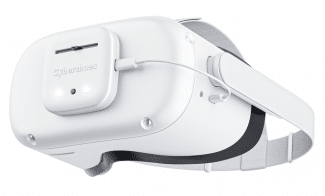Cybershoes for Oculus Quest give you the means to move convincingly in VR using your actual legs without ever needing to physical stand up from your chair. And, believe it or not, it actually does a pretty good job. Here are our first impressions of the Cybershoes for Oculus Quest. The Kickstarter campaign for Cybershoes on Quest is fully-funded at over twice their goal with an end date of December 31.
Cybershoes on Oculus Quest
Over two years ago I wrote about my experience using the original iteration of the Cybershoes, which were designed to be used with a PC VR headset tethered to a PC. This newest model supports both Quest and PC VR.
The most intrusive part of the previous setup is that you had to dangle the HMD wire above your head with a little fishing rod-style contraption that was a pain to setup and took up lots of space. That’s no longer the case with the wireless, standalone Oculus Quest headset.
While it might seem redundant to use a device that lets you move around in VR with your legs since you could just, you know, stand up and move around in VR with your legs using a Quest already, but there are some unique advantages with Cybershoes. Not only does it mean you don’t need to worry about your Guardian boundaries and room size constraints, but it also should help tremendously for those with motion sickness concerns.

The act of swinging your feet and twisting around in a chair adds that physical element most VR is missing that can, for many people, alleviate the VR sickness woes. Personally, I don’t get motion sick or VR sick so I cannot confirm nor deny the effectiveness, but many users have reported results after using these and the previous PC VR version.
The concept here is very simple. You strap on these open-style shoes that slide on the ground and simulate actual movement. The bottoms of the shoes have sensors that tell your VR headset which direction you’re moving.
If the game has analog stick / gamepad movement support at all, then it should work with no problems. For Oculus Quest many of the top games, like Arizona Sunshine, Myst, and The Walking Dead: Saints & Sinners all work great right out of the box.
Thankfully setup is dead simple. All you have to do is strap the Cybershoes onto your feet, attach the little box to the front of your headset, which is incredibly light, and plug that in the side. There are no wires to worry about at all.
At first it takes some getting used to. Rubbing your feet across the floor to move isn’t exactly a natural movement nor is it super intuitive, but it starts to click after a while. The concept is the same as you see in other movement solutions, such as the treadmill-style options from Omni, but you’re seated instead.

Admittedly I don’t think I see myself using Cybershoes for Quest very often even though they absolutely do work as advertised. To me, the physicality of standing up and moving around a room is far more immersive and important than rubbing my feet on the ground. However, I can see some use cases for this.
If you get motion sick easily and traditional artificial locomotion in games like The Walking Dead: Saints & Sinners always makes you uncomfortable, then you could totally try using Cybershoes as a way to circumvent that side effect. Alternatively, if you have a disability that prevents you from standing for long periods of time but you can still move your legs, then this is an excellent middle ground.
So to be perfectly clear: yes, Cybershoes works as intended and removing the wire from PC VR makes it far more user-friendly and compelling, but, just like the 3DRudder, I fail to see a compelling reason to use this instead of just moving around a room. Even if you don’t have enough space for roomscale and would just be standing in one spot and leaning around I’d still rather do that than be restricted to sitting in a chair while in VR — especially when using a standalone, wireless, roomscale headset like the Oculus Quest or Quest 2.

Maybe that will change once more developers add support, but as it stands it’s hard to imagine a world where sitting down with sensor shoes is the ideal way of enjoying otherwise roomscale VR.





